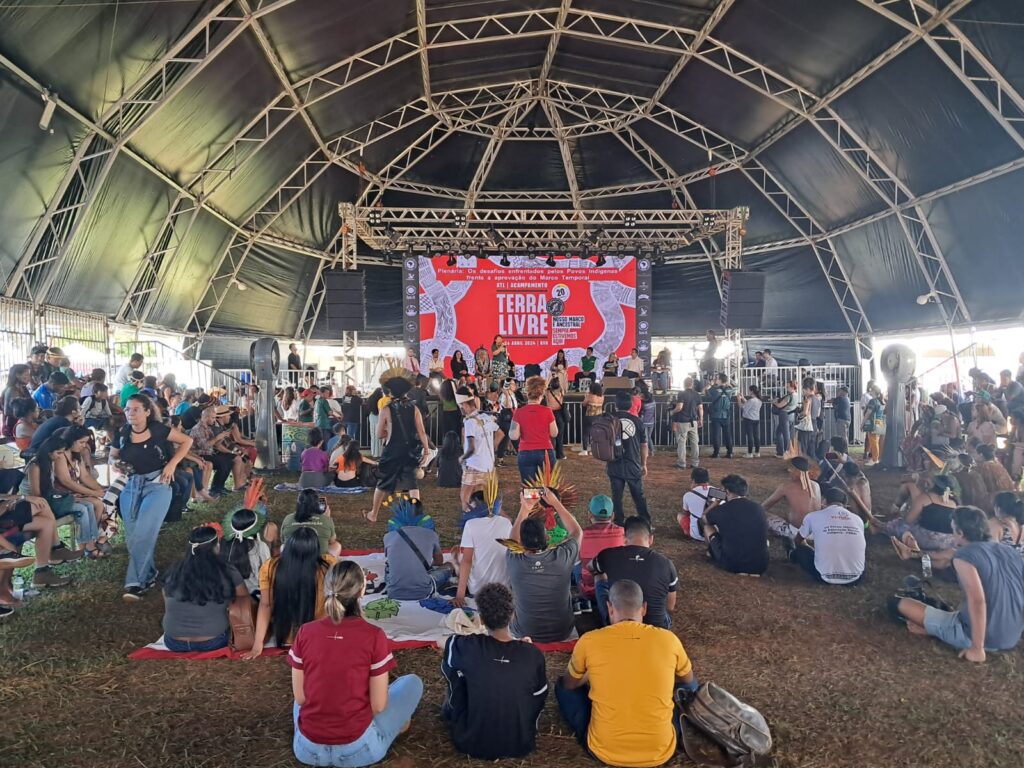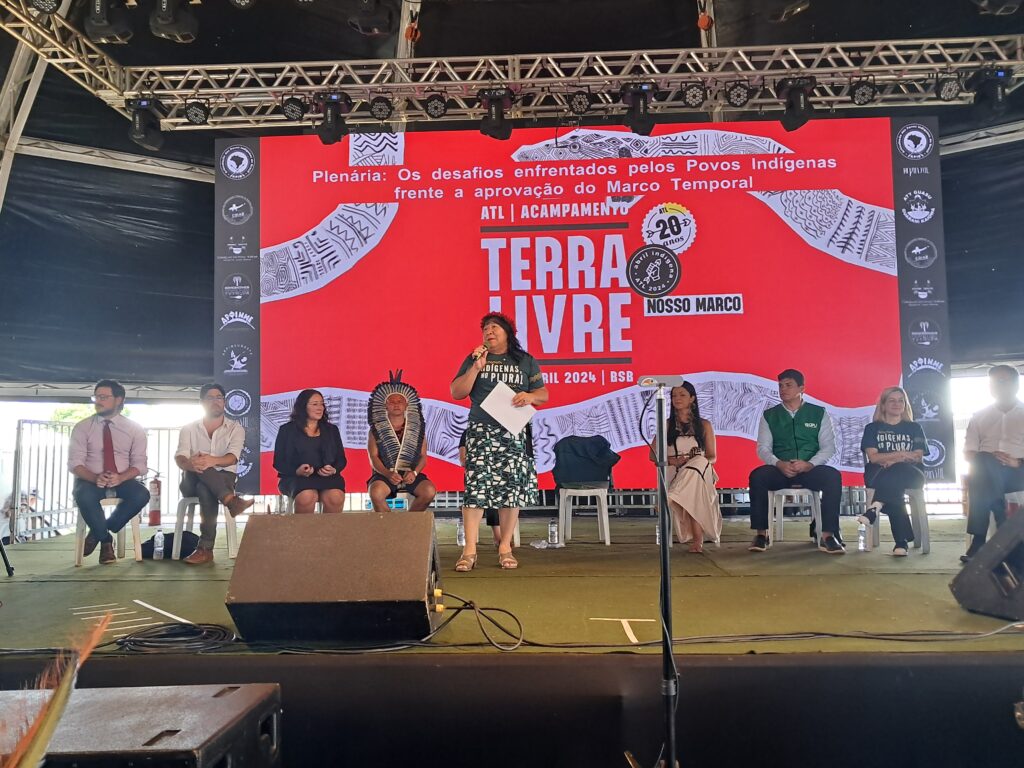Mendes wants to trade entrenchment clause of a Constitution
In the game of power between the Powers of the Republic, the prime minister of the SUPREME court opens the reconciliation on the territorial rights of the indigenous peoples. During the 20th Camp in the Land of the Free, the lawyers strongly criticised the decision.

Lawyers, indigenous peoples, the indigenous, the president of the National Foundation for Indigenous Peoples (Funai) and the representatives of the different levels of the Judiciary were presented this week at the 20th Camp-Land of the Free (ATL), to the decision of the prime minister Gilmar Mendes, in the open, with a reconciliation to the actions involving the law, 14701, 2023, also known as the law of the framework over time. In a unanimous decision, pointed out that it is not a negotiation, given that they are unconstitutional, and that the routing opens up the possibility for setbacks upon the territorial rights of the indigenous peoples.
In making its decision, the prime minister leads to the need for greater legal certainty for the apparent conflict between the two possible interpretations of the law. Kari Guajajara, of the Coordination of the Indigenous Organizations of the Brazilian Amazon (Coiab), asks: “what is That legal certainty, it is that the Mendes speaks out on his decision if he does not have suspended the effects of the law. That legal certainty, it is that the Mendes speaks out on his decision whether to Deny the Pataxó was put to death in the process?”.
The actions under review by the minister Gilmar Mendes
The Direct action of the Constitution of 87 – violation of the rights of indigenous peoples, the search for the legality of the approval of the president of the Republic on law, 14701.
Direct actions of Unconstitutionality 7582, 7583, and 7586 – in favor of the rights of indigenous peoples, filed by the parties of the centre-left and the APIB.
The Direct action of Unconstitutionality by Omission 86 – disadvantageous to the indigenous peoples, he asks for the regulation, which sets up the relevant public interest of the Union,” in proceedings of the indigenous use and management of native lands.
“The constitution of 1988, being dismissed, the law originated in the indigenous peoples, for the exclusive use of the lands,” says Maurice Availability of the Articulation of the Indigenous Peoples of Brazil (APIB).
Joenia groups intersect, the president of Funai, which has had a history of a thesis in the framework of a temporal, that is used as an argument, and at the time of the demarcation of Indigenous territory of Raposa Serra do Sol in 2009, but that there had not been dissolved. Within the report, brought down to the very mark of a temporal because you don’t have any consistency, one can say that the indigenous people have rights and constitutional rights, originating in the beginning of the imprescritibilidade of the unavailability of the right and the duty of the State to demarcate and protect the lands of indigenous peoples, and, on the other hand, it opens a backdoor to the challenge of a’s right to territorial, with a thesis in the framework of a temporal”.

The thesis of a rose, then, and in later times as a form of messing up on the territorial rights of indigenous people, and is recognised as the pre itself, the emergence of the State. The last year of the thesis, but it was rejected on to the SFT and, in contrast to the judgment of the Court, right after it was built-in in-law-14701 National Congress. “As we have seen, it is a crisis between the Judicial branch and the Legislative branch, which has been in the making, which is caused by the bench, period. They are all the time trying to develop into a crisis of the Supreme Court,” said Juliana de Paula Batista, and of the social-Environmental Institute (ISA).
Kari Guajajara, of the Coiab), to assess the role of the Executive in the process of weakening. “It is strange that a few days ago, the president of the country, he made a speech, is extremely problematic when it signed on the demarcation of the two lands of indigenous peoples, ‘ a statement that the descaracterizava article 231 of the Federal Constitution, and it became a landmark period of occupation, and, at the time, and after the Executive’s opinion, we have courts to show their presence in the same direction”.

Mauritius is the Availability of the APIB, points out that in addition to the landmark, the temporal and the many other articles on the law of 14701 change of the constitutional rights of the indigenous peoples. “The inside of this law, they want to free up large business enterprises in the territories, and they want to make the query, in the free, prior and informed consent, which is a right guaranteed to us”. The lawyer, Aluísio Azanha, the Centro de trabalho Indigenista (CTI), states that the decision of the minister Gilmar Mendes opens up the possibility of trading to go, these projects aimed at the expropriation of indigenous peoples ‘ lands.
The state attorney for the 6th Chamber of the MINISTRY, When the Torellis, he explained that the law, 14701, the processing of the demarcation process is subject to a rite of its own and is different from the 1775/1996 as has been the case up until now, the cause of the feedback of the procedures demarcatórios to the beginning of the course.
The reconciliation is impossible
In the face of a decision by the minister Gilmar Mendes, the public prosecutor general of the Republic of Felicio Pontes, the Federal Public Ministry (MPF), in Brasília (DF), explained the strangeness of the decision, it will also relate to the interests of loggers, farmers, mining companies and power over the earth. “I’m asking myself the question here is, how to cope with these rights. How to cope with the fundamental rights. How to reconcile the right to the land, which is a fundamental right of indigenous peoples”, you ask.
Rafael Modesto, an attorney for the Indigenous Missionary Council (CIMI) pointed out that the entrenchment clause is not the subject of the mediation. “It is impossible to negotiate with inalienable right, not an inalienable, as the Supreme, as the entrenchment clause,” he said.
In spite of a major threat, and the present, have argued that the law may be reviewed by the pressure of the society. “You’ve got all of the possibilities and the legal argument,” he said Joenia groups intersect and highlights the courage, the strength and the persistence of the indigenous people. “The thesis is the framework for temporal is the thesis in politics and it only fells a thesis political force in politics. It is the strength of the indigenous movement, it’s going to bring down the thesis,” he concluded, Kari Guajajara.
